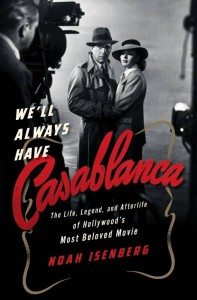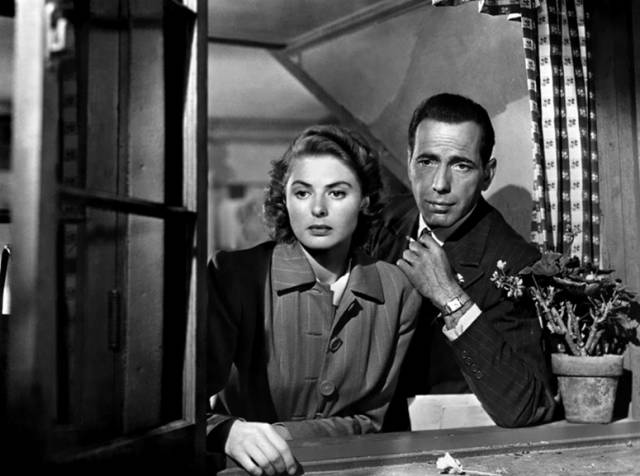

A foggy tarmac, the sound of an airplane engine, two lovers in matching trench coats and hats embrace as if it was the last time, precisely because it is their last time. Few moments in cinema history are as instantly recognizable as the dramatic crescendo that is the finale of Casablanca. From parody, to homage, to deconstruction, the film has become an essential part of American lore, perhaps because in many ways it is the ultimate movie. Its appeal is undeniable, almost annoyingly so - can you think of another movie as addictively watchable as this one? “Real life” can be put on hold when Casablanca is playing, for what can be more “real” than the emotional journey it takes you on? For those who love the film, and have always tried to decipher what exactly about the sum of all its odd parts it is that allowed it to become the shaggiest of masterpieces, Professor Noah Isenberg has come up with an atlas to help you navigate through its wonders. In We’ll Always Have Casablanca he explores the myths built around the film, as well as the seemingly serendipitous events that revolved around an unproduced play, that became the most iconic of all Hollywood films. I spoke to Professor Isenberg about the themes he explores in the book, introducing young audiences to classic films, and why Casablanca is perhaps more relevant now than ever.
How much of writing the book was you trying to figure out the spell the movie cast on you?
In many ways I was trying to understand something that defies comprehension in terms of magic, alchemy or whatever you wanna call it. The film definitely cast its spell on me, I tried as a film historian not to get too enraptured by certain moments in it, but I wanted to pull back a little bit to avoid just gushing about the film. When I first pitched the book it was called Everybody Comes to Rick’s and the subtitle was “How Casablanca Taught Us to Love Movies”, so implicit in that subtitle was this idea to try as best as we can to understand how this holy grail of classic cinema did teach us how to love movies.
Can you talk about the way you divided the book by themes rather than taking a chronological approach? Were there themes you were interested in exploring but had to leave out of the book?
Strange as it may be to admit, and for you to be told, I think I did stick to the script I outlined for myself. I needed to write this book fast, my publisher wanted it to be out by the 75th anniversary because people would be talking and seeing the film, Warner Bros. will do a re-release in November, so I had to work very quickly for an academic. We’re notoriously slow, we don’t have deadlines like journalists do. I wrote a piece inspired by My Lunches with Orson in which Henry Jaglom and Orson Welles talked over lunch, and there’s a short chapter in which Welles confides his infatuation with Gary Cooper, but also he speaks about his appreciation for Casablanca, and how Marlene Dietrich convinced him it was an important movie people would be talking about. I learned about this too late for it to be in the book though.
 That’s interesting because Touch of Evil, is a border town story like Casablanca…
That’s interesting because Touch of Evil, is a border town story like Casablanca…
Oh yeah, there definitely are affinities, I’m not sure Welles would admit them. He does come clean on Marlene being right, she plays Tanya the gypsy woman who’s smoking her little cigar when she says something like “you better watch it” or some great Marlene line like that. Touch of Evil doesn’t have the refugees though, so going back to the themes, that’s one thing I wanted to make central in the book. I wanted to give the refugees - all the actors, technicians and film professionals - their due credit. I have academic training in German studies, I lived in Berlin, Munich, Vienna, and as a teenager I lived in Sweden, so I have the language backgrounds, and wanted to bring this to the story. The film is a great romance, but underneath all that it’s a refugee story.
I watch Casablanca after break ups because it makes me feel better, but it’s also a funny movie, and the refugee aspect makes it very political. Is there one genre you think the film fits more than any other?
I would say it’s a refugee story, it’s one of the greatest refugee stories to be ever put on screen. From the very beginning motion pictures have been a very cosmopolitan arena, people from all over the world have always been involved in making movies. Of course it’s also a great romance, made even greater because it doesn’t have a happy ending. But for me it’s about refugees, and I think that’s what many readers will take from the book. The film also fits into the wartime propaganda genre, it helped convince people that it was important to get behind the Allied forces to defeat evil. That was in fact what the Office of War Information wanted after Pearl Harbor, that movies highlighted the significance of the war. The Warner brothers themselves had a personal stake in this as well, they felt doing films like these was a righteous cause, they felt the heinous crimes in Europe needed to be exposed. This was about reminding the masses that it was time to engage, the Epstein twins too had worked with Frank Capra in Why We Fight, there’s an overlap between the two. It’s strange to realize the twisted affinity we have between then and now, what Donald Trump and his henchmen are up to these days is taking us back to a period of total isolationism.
It seems that younger generations who are more aware about racial and social injustice have a hard time connecting to films made before their time because they fail to get past the modern issues they might have with the film. I was so fascinated by the realization that Casablanca had been controversial for its positive depiction of African Americans and thought this might be a great approach to introduce the film to skeptics. What other angles do you think would work to get younger audiences to give classic films a chance?
Interesting, and hard to answer because I can hardly blame people of color for not wanting to see films in which African American actors are relegated to play maids and cooks. So if they see Dooley Wilson in Casablanca it might not seem revolutionary to them, but as I quote in the book - and it was one of the biggest archival discoveries I made considering this movie has been extensively written about since it came out - was the review from the New York Amsterdam News, which was the first major African American paper, and reading the review through the eyes of that critic really opened my eyes. Going back to my early viewings of the film, I never thought Sam was as fully formed as the other characters, but then I learned how limited roles were for African American actors. After playing Sam, Dooley Wilson went on tours and did shows, but he never found another role like that, which is very sad.
I teach a lot of film noir, and students have no trouble watching those crime movies, they even like the pulp novels that inspired them. I have to say I’ve done seminars on Casablanca at the New School where I trace the story of actors before the film and go through their careers, and many of the students become very engaged with the films, even as far removed as they may seem from what they’re familiar with. I have two boys, a soon to be 11-year-old and a 6-year-old, and I watched the film with the older one and he was really, really drawn into it. This is a 21st century child, who needs quick cuts, lots of action, but he was very into the film. I think it had something to do with how Nazis in films represent the epitome of evil, so I think he liked the clear division between good and evil. For those of us who’ve seen the film so many times there are many shades of grey, but for a child there’s something reassuring in the archetypes of good vs. evil.

What have been some of your most memorable viewings of Casablanca?
I’ve watched it alone many times, but the most memorable times have been familial. My mom is practically a fanatic of classic films, so we watched this, and things like Meet Me in St. Louis. As a teenager I was resistant to liking what mom liked, but decades later seeing it with my son was very moving. I’ve watched it many times recently, Lou Lumenick said when I interviewed him that Casablanca was one of those films that regardless of where you show it, and who the audience is, people are very responsive. They laugh, cry, they respond audibly, you hear their sighs, it’s all so palpable, you can feel the texture of their response. Like I mention in the book, I watched the film in Washington Heights with Spanish subtitles and that was incredibly interesting to me, people came in costumes and period clothes.
So one last thing, are you Team Rick or Team Victor?
(Laughs) That’s an easy one! I’m definitely Team Rick. I love Victor, he’s great and the poor guy gets put in the back seat, but it’s all about Rick. Let’s face it, he’s the one who denies himself his true love, it’s hard to beat that!
We’ll Always Have Casablanca will be available on 02/14. For more information visit: https://books.wwnorton.com/books/Well-Always-Have-Casablanca/